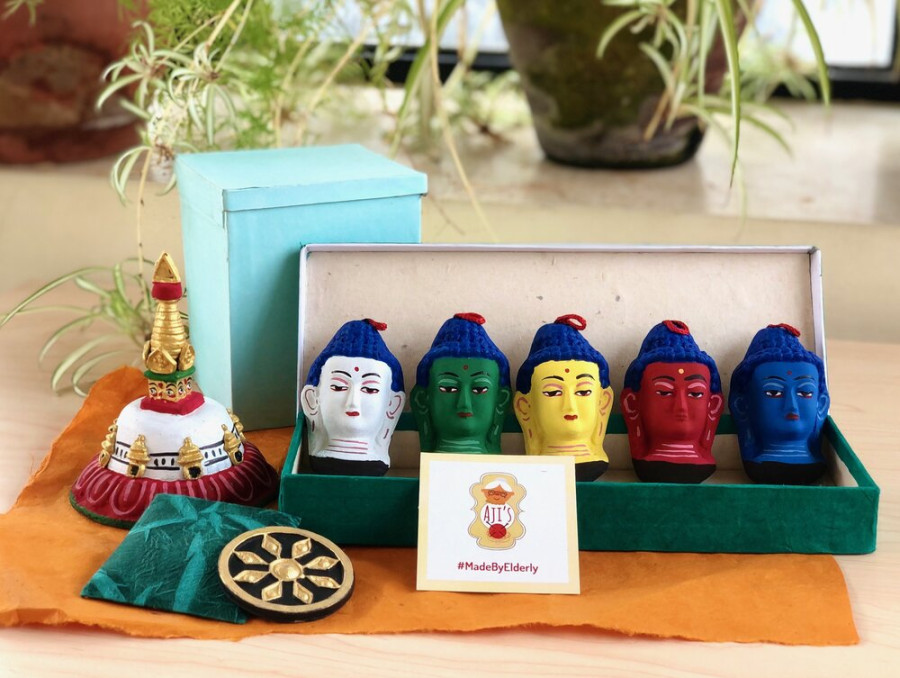National
Covid-induced shift to digital has enabled women-led businesses to survive and thrive
Despite the challenges of accessibility, affordability and applicability faced by women-led enterprises, organisations have worked to overcome those obstacles.
Aakriti Ghimire
After the LPG gas explosion at Radha Laxmi Shrestha’s home in 2006, she lost her mother and survived after 39 days in the hospital.
Radha’s desperate desire to be financially independent led her – alongside five other burn survivors – to establish ‘Radhako Burn Survivors’ in 2017.
However, the pandemic drastically impacted their candle-making business.
Unable to find a market for their products in a digitally advancing world, they were close to losing their jobs. Fortunately, another women-led enterprise came to their rescue.
“When we were unable to sell our products, Herveda Botanicals took our products and found a market for them in their online store,” says Radha gratefully. “They display our products on their page. They have the knowledge and ideas that we don’t.”
Radha’s story evidences the importance of digital technology for women to become self-reliant and financially independent.
The pandemic greatly influenced many women-run businesses to shift to the digital world to market their products. While some women found other women enterprises or organisations to support their work, many women took it upon themselves to expand their digital literacy skills to ensure their survivability. Digital technology – social media and web platforms – has enabled women to expand their market and increase sales.
Herveda Botanicals is a women-led enterprise and an advanced natural skincare and wellness brand whose products are formulated in Nepal using Himalayan medicinal herbs, traditional medicinal knowledge and latest scientific innovations in skincare.
“Technology is at the core of our companies since our enterprise heavily relies on research and innovations. While we had social media accounts for Herveda Botanicals, we started e-commerce integration/sales online especially after the first COVID-19 lockdown,” says Dr Prativa Pandey, the founder and chief executive officer at Herveda Botanicals. “It has accelerated our sales, visibility, reach and competitiveness.”
Herveda has five full-time female employees, and directly employs more than 30 women on part-time basis or through collaborations throughout the supply chain.
Many existing enterprises, such as Herveda, maximised their usage of digital technology after the onset of the pandemic. However, many women were forced to seek alternative means of income because of the pandemic, which led them to the digital realms where they embarked on an entrepreneurial journey.
Tshering Ongma Gurung Ghale, who runs a hotel in Manang, was forced to find new ways to sustain herself economically after the pandemic crippled the tourism industry. Digital technology came to her aid in establishing and promoting her new venture.
“Manang relies on tourism for its economy. The 2020 lockdown heavily impacted us financially. I started talking to a lot of locals about what we can do to uplift our lives. And that’s how we decided to start growing potatoes and selling them elsewhere,” said Ghale.
Ghale, alongside six other founding members, formed Manang Direct – an enterprise that sells locally grown organic products from Manang directly to places such as Kathmandu, Besisahar, and Pokhara.
“Social media played an important role in promoting our products. It made marketing extremely easy and allowed us to show our products to a large audience,” says Ghale.
Manang Direct today has expanded its products to dried meat and sun-dried vegetables (carrots, cabbage, radish, stinging nettle, etc).
However, entering the digital realm was a challenge to many existing women-led enterprises. Inability to access gadgets and the internet, or being unable to pay for the internet bills or electricity bills, or because of lack of digital literacy skills, many women-led businesses took a hit, according to experts.
“Many women entrepreneurs were disproportionately affected by the pandemic. Their likelihood of leaving the entrepreneurial ecosystem is very high. As these external shocks impact their businesses, they are limited in skills to deal with it,” says Mona Shrestha, the chief executive officer of Enterprise for Management, Economic Reforms and Gender Equality (EMERGE), a consulting and capacity building company. “That is why, it was essential for us to intervene, build our own capacities and then share that with entrepreneurs running micro, small, and medium enterprises,” Shrestha explains.
Experts say that a majority of women become entrepreneurs because of passion, hobby and a desire to be independent. Their income is mostly considered secondary, which makes their entrepreneurial projects most vulnerable to sudden changes in their social, political and natural environments.
To ensure that women are able to sustain in the economy, the Federation of Women Entrepreneurs' Associations of Nepal (FWEAN) and EMERGE began by training themselves to use Zoom, as they reimagined ways to connect with women entrepreneurs.
Shrestha – alongside EMERGE and FWEAN – found one of the major challenges was a disruption in the supply chain. However, amidst the varied set of problems of each business, the common thread was a deteriorating mental health of women entrepreneurs.
“Their products can’t reach the market, materials for products weren’t available, many women could no longer commute to work,” according to Shrestha. “But it was very striking to see that most women were mentally disturbed during the time.”
To address the challenges of women-led businesses, Shrestha says they began by addressing ‘softer’ issues of entrepreneurship – such as mindfulness.
FWEAN with EMERGE, and Thulo [an online store] trained 68 women-led businesses on mindfulness through sessions on Zoom. That led to a series of support provided by FWEAN in partnership with the United States Agency for International Development (USAID)’s Tayar Nepal project.
From June to September 2020, ‘Revitalizing Women’s Business Amidst COVID-19 Pandemic’ was piloted to support micro, small and medium women entrepreneurs cope from the impact of COVID-19 on their businesses and set a base for disaster preparedness and economic recovery and resilience.
“We also conducted a rapid assessment of 363 women entrepreneurs. We provided online business management training for 28 women. We even mentored 18 women businesses and sold 221 of their products online. In a span of four months – June to September 2020 – we accomplished a lot,” according to Shrestha, who is also an international expert on Gender Equity and Social Inclusion.
As women moved to digital platforms, understanding their limited set of skills, Shrestha says, they designed training modules to develop their digital skill set in collaboration with Thulo.
“We trained women on digital skills, such as setting up emails, zoom, Facebook, Tiktok and about how to use them. We also taught them how to upload their products on thulo.com, how to upload pictures and craft persuasive descriptions that would make the consumer buy their products” adds Shrestha.
As of now, 48 businesses and producers have been connected to Thulo and more than 350 products have been promoted on the platform.
This is an ongoing project ‘Fostering Resilience of Women Led Businesses’ (August 2021 – May 2022) and is implemented by Thulo.com and EMERGE.
On a positive note, experts find that women businesses would have been left far behind in digital technology if not for the pandemic. Roshee Lamichhane, Assistant Professor at the Kathmandu School of Management, conducted a research pre-pandemic on digitization and youth entrepreneurship. She found that women generally had a laid-back approach to digitization, where they were hesitant in adopting new technology for marketing, before the pandemic.
Thus, she perceives this shift, where many women are adopting digital technology for their enterprises, though challenging, as an encouraging one.
“Ever since the pandemic, all these women who probably would have never been able to get digital training, got the opportunity to. At the very least, now many know the use of Facebook for their businesses as well. And now that they are aware, they have slowly started getting interested and adopting these new things,” says Lamichhane. “What could have taken years to achieve has been achieved sooner.”
Many women-led businesses also used digital technology, post-pandemic, not just to find consumers for their products but also to find artists, makers and producers of similar products. Utilising Facebook and Instagram as marketing tools, enterprises such as Mithila House and Aji’s Products find social media to be crucial to their existence.
“We began by selling our products on Facebook, and today we work with ten independent women Mithila artists. They all connected with us through Facebook, and we also have a physical store with two artists available on-site,” says Trishna Bhandari, a co-founder of Mithila House.
While Mithila House is in the process of becoming international, Aji’s Products can be found on Etsy – an online store – internationally.
Mithila House sells eco-friendly products, such as handpainted copper bottles and home decor items made by Mithila artists.
Likewise, Aji’s Products sells items made by elderly people, such as hand-knitted socks, sweaters, poncho, caps, scarves, etc. They also sell statues, glass-bead bracelets, silver bracelets and silver earrings.
While the pandemic severely impacted women-led enterprises, and many women have found new ways of sustaining in the pandemic. It developed a sense of community, solidarity and support among women-led enterprises as well.
Radhako Burn Survivors survived the pandemic through such collaboration and uplift by another women-led enterprise.
“It is women supporting women. If not for Herveda Botanicals, perhaps we wouldn’t have survived. Somehow my sisters have work today, and that is because their help to us has been massive,” says Radha.




 8.79°C Kathmandu
8.79°C Kathmandu















